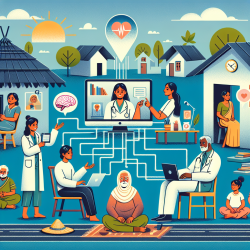Introduction
In the ever-evolving landscape of mental health care, the advent of telemental health services has become a pivotal solution, especially in post-disaster and low-resource settings. The research article "The Role of Telemental Health, Tele-consultation, and Tele-supervision in Post-disaster and Low-resource Settings" provides valuable insights into the effectiveness of these modalities. This blog aims to guide practitioners in enhancing their skills by implementing the outcomes of this research or by encouraging further exploration into this field.
The Importance of Telemental Health
Telemental health, which includes tele-consultation and tele-supervision, offers a promising approach to bridge the gap in mental health services in areas affected by disasters or conflicts. The COVID-19 pandemic has further highlighted the need for remote mental health services, as traditional face-to-face interactions have been limited.
Key Findings from the Research
The research underscores several critical findings:
- High Need for Mental Health Services: There is a significant demand for mental health services in low-resource settings, often exacerbated by disasters and conflicts.
- Effectiveness of Tele-consultation and Tele-supervision: These modalities have been found effective in ensuring quality mental health care delivery, as demonstrated in two case studies included in the research.
- Training Recommendations: The authors recommend developing specific training to enhance the skills of consultants and supervisors in tele-consultation and tele-supervision.
Practical Implementation for Practitioners
Practitioners can improve their skills by incorporating the following strategies based on the research findings:
- Engage in Specialized Training: Seek out training programs focused on telemental health, particularly those that address cultural and ethical competencies in tele-consultation and tele-supervision.
- Utilize Asynchronous Communication: In areas with limited bandwidth, asynchronous methods such as secure video uploads and online forums can facilitate effective consultation and supervision.
- Develop a Safety Protocol: Establish a tele-health patient safety protocol to address potential emergencies during remote sessions.
- Foster Continuous Learning: Encourage ongoing research and adaptation of new technologies and methodologies in telemental health.
Encouraging Further Research
For practitioners interested in delving deeper into the field of telemental health, the research article provides a comprehensive foundation. By exploring additional case studies and engaging in collaborative research projects, practitioners can contribute to the advancement of mental health services in challenging environments.
Conclusion
The integration of telemental health services in post-disaster and low-resource settings offers a vital opportunity to enhance mental health care delivery. By implementing the research findings and continuing to explore innovative solutions, practitioners can significantly improve outcomes for underserved populations.
To read the original research paper, please follow this link: The Role of Telemental Health, Tele-consultation, and Tele-supervision in Post-disaster and Low-resource Settings.










